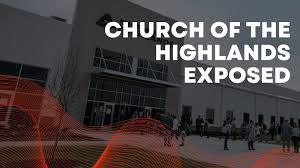The Church of the Highlands, one of the largest and most influential churches in the United States, has recently faced intense scrutiny. With multiple campuses and a significant following, this megachurch has been under the public microscope for various reasons. Questions have been raised about its financial practices, leadership approach, and the ideology it promotes. In this article, we delve deep into the issues that have caused a stir and examine the implications for the broader Christian community.
History of the Church of the Highlands
Founded in 2001 by Pastor Chris Hodges, the Church of the Highlands rapidly grew into a sprawling network of churches across Alabama. The church’s appeal has largely been due to its modern, non-traditional approach to worship and its emphasis on community involvement. Over the years, the church has expanded its reach beyond Alabama, becoming a key player in the national evangelical movement.
However, as the church grew, so did concerns about its structure, finances, and leadership practices. Critics have argued that the Church of the Highlands, like many megachurches, operates more like a business than a place of worship.
Financial Transparency: Where Does the Money Go?
One of the most significant concerns surrounding the Church of the Highlands is its lack of financial transparency. Despite the church’s immense size and wealth, there have been accusations that the church is not forthcoming about how it spends its donations. Many have questioned whether the funds are being used for charitable purposes or if they are benefiting a select few at the top of the organization.
Critics argue that megachurches like the Church of the Highlands often collect millions of dollars in tithes and donations without providing detailed financial reports to their congregation. This lack of transparency has led to suspicion about potential mismanagement or misuse of funds. While churches in the U.S. are not required to disclose their finances, many believe that such large organizations should be held accountable, especially when they wield such considerable influence.
Leadership and Accountability: Is There a Power Imbalance?
Another area of concern for those examining the Church of the Highlands is the structure of its leadership. Pastor Chris Hodges holds significant authority over the church, and many have questioned whether there is enough accountability within the leadership structure. Critics point to the centralized control of megachurches, where a small group of leaders often holds immense power over the congregation and its resources.
In some instances, this lack of accountability has led to scandals in other megachurches, and many are concerned that the Church of the Highlands could be following a similar path. The question remains whether the leadership is serving the best interests of its congregation or whether it is using its influence for personal gain.
The Ideology of the Church: Conservative Values and Controversy
The Church of the Highlands is known for promoting conservative Christian values, which have, at times, stirred controversy. The church’s stance on issues such as same-sex marriage, abortion, and gender roles has drawn criticism from more progressive groups. Additionally, the church’s involvement in political matters has raised eyebrows, with some accusing it of blurring the lines between religion and politics.
One particularly controversial moment came when Pastor Chris Hodges was criticized for liking social media posts that were seen as racially insensitive. This incident led to widespread backlash and calls for greater scrutiny of the church’s ideological stances.
Social Impact: How the Church Influences Communities
Despite the controversies, there is no denying that the Church of the Highlands has had a significant impact on the communities it serves. Through various outreach programs, the church has provided assistance to the homeless, supported local schools, and offered aid to those struggling with addiction. These efforts have been praised by many, and the church’s role in providing for its community cannot be ignored.
However, critics argue that the church’s good deeds are overshadowed by its opaque financial practices and controversial leadership. Some believe that the church’s influence has grown too powerful, with its reach extending beyond spiritual guidance and into political and social arenas.
The Megachurch Phenomenon: A Larger Issue?
The concerns raised about the Church of the Highlands are not unique. Across the U.S., megachurches have come under fire for their corporate-like structures, celebrity pastors, and massive financial resources. The line between faith and business often seems blurred, and the power dynamics within these churches raise questions about the true nature of their mission.
Megachurches like the Church of the Highlands often appeal to a younger, more diverse audience by offering a more modern take on Christianity. However, this modern approach has led some to question whether these churches prioritize growth and wealth over spiritual integrity.
What Can We Learn?
The controversy surrounding the Church of the Highlands serves as a reminder that even religious institutions must be held accountable. Transparency, accountability, and ethical leadership are essential in any organization, and churches are no exception. As more people begin to question the practices of megachurches, it is vital for these institutions to address concerns head-on and ensure they are acting in the best interests of their congregation.
Conclusion
The Church of the Highlands stands as a symbol of the megachurch phenomenon in the U.S., with both its achievements and controversies under the spotlight. As the church continues to grow and influence more communities, it must balance its expansion with accountability and transparency. Only by addressing these concerns can the Church of the Highlands maintain its reputation as a positive force in the Christian community.
Also Read: What Does Glizzy meaning?

